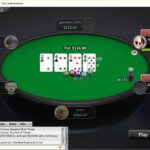Point 39: Implied Odds
A good portion of any reason to call a bet or raise is the estimated odds of being able to achieve a pile of chips should you be lucky enough to hit a monster of hand. The obvious question becomes, how does one estimate these odds accurately enough to make a call? Say you have my favorite dog hand, 67s, on the button and there is a raiser and 2 cold callers in front of you. How much is too much to call? 10% of your chips, 2%?
In my opinion, you are going to have to gauge the level of post flop aggression, in general, at the table. There are some games where 80% of the action is preflop with one bet on the flop. These are not the games to limp in with marginal hands that need substantial implied odds. If no one is paying off big rigs, you won’t need a big rig to win anyways. You just need balls to bet in position.
This may seems confusing, put it another way, if you are in a poker game, you are not worried about implied odds. Very few hands are being shown down anyways, so your cards are not at issue. The issue is position, the styles of the other players, not cards. Implied odds is a concept for cards games, ie the poker games where you are going to have to make hands, because the blinds are not big enough to play poker yet.
Conversely, especially in the small rebuy tourneys I have noticed, the play is relatively passive preflop with massive postflop aggression. Every top pair and a lot of second pairs are flailing away trying to double or triple up. When the chips are flying and huge stacks are being built, find a way to see flops with as many reasonable hands you can.
The hands you are looking to hit with implied odds types of hands, small pairs, suited connectors, suited Ax, one gapper suited cards, etc. are 2 pair and up. You will flop the big rigs less than 5 % of the time. Maybe make a big hand by the river 10% of the time. Most of the time you will not even be able to call to draw to the river. A lot of people that play these hands overvalue their small pairs and draws, making a perfectly legitimate calls preflop and burying themselves post flop with speculative calls to overpairs and big cards that come.
You have to be very willingly to lay down small cards that don’t hit big into anything more than minimum aggression. It just isn’t worth it. I am not saying don’t raise if you know the bettor is bluffing, just don’t call along, hoping to hit that second small pair.
Heads up play, implied odds take a different tone. After just a few hands heads up you will know your player, is he playing his cards, waiting for big aces and pairs to take you on or will play em all. If you are playing an animal like rippy, who will shove them all in repeatedly, you are forced to see all the flops he lets you into. All you have to do is hit one hand and you will double up, probably win. Note I am not saying join the raise party on 5-2, just see the flop if they let you.
Playing a very passive player heads up leaves you with very little implied odds, steal them blind preflop. If the only time they will call or raise is with a joint, don’t be limping with them. You will save a lot of chips finding out where they are at preflop anyways.
With just a little knowledge of implied odds, many a novice poker player has blown himself up. You see, every hand you are dealt has implied odds that are positive in the early rounds. Even a 7-2 off makes 2 pair as much as any other 2 card hand. Most players actually have their lucky hands, K4 or Q7, that they have fond memories of squashing an AA with. Or the time they got hard headed with that A5 and drew out on KK.
Once you understand this concept of implied odds, I suggest you pay it no heed. If you always have a least pot odds, implied odds are just a great Bonus that takes you to victory.
Point 40: What Do They Have, That You Don’t?
We have all gotten to see the world’s “best” poker players on TV in the last 2 years. Making names for themselves and winning millions of dollars. What makes them so special. Why isn’t that you?
Are they smarter than you? On balance, not likely, poker is not a game for the super intelligent like chess. The same situations repeat over and over with some subtle nuances, but super intelligence is not necessary and could very well be a detriment. It is actually helpful at times to approach the game very simplistically. If this happens I do this automatically. Takes the emotion out of it.
Are they more patient? More that likely yes. Poker Rewards the patient investors who continually reinvest their winnings in situations with positive expectations. It one long game with peaks and valleys. They realize they cant win all the time. That being said, patience is truly a necessary virtue.
Are they more trainable, teachable? Very likely yes, all the interviews and writing from the worlds top players talk about how they are constantly reevaluating their game and consulting with coaches. Some have even formed mentoring groups with one top pro training them all. Poker is a work in progress for them.
Do they go on tilt? Not very often. Top pros have long since shed this biggest of all faults. You can not go on tilt and beat the 100’s of the best players. Just can’t be done. Now do some of them pretend to go on tilt, absolutely, but it’s an act.
Is their tolerance for risk higher than yours? Very likely. You don’t get to play for millions without risking 1000’s along the way. Chris Moneymaker is comparable to a lottery winner, that is not the way the story goes with most top pros, they work their way up.
So you say, I want to be a pro, I want to play on TV. All you have do is be like them. Patiently build your bankroll, constantly improve your game, get mentally tough, refuse to say and do dumb things, and be optimistic.
Point 41: How and Why to Bluff and Thoughts on Rippy
BigRed specifically asked me to write this post. He mentioned he always seems to get caught bluffing and figures he is doing it wrong. I figure he’s right.
The whole purpose of a bluff is too get chips, sometimes a little, sometimes a lot, but you want the chips and you want them now with no further risk. It is important to recognize who is likely to give them to you. Not everyone at the table is bluffable, that is a good thing, but can be very detrimental to your stack if this is who you decide to make a run at.
The best people to bluff at are tight players. People playing very few pots and people that rarely call, they are either in or their out for big stacks. These people value their chips and their chip position and are unlikley to risk their stack on anything other than premium hands. The beauty of betting into them is ( and I really didnt get this until recently) they know your bluffing, they have a great read on you, but they will lay them down anyways because they have very little to call with and it is not worth the risk. They are waiting for aces to come over the top of you and give you your come uppance.
Rippy taught me that while watching him. He sat there and raised about every other hand in a sng and then showed them the worse crap imaginable almost everytime he raised. It was amazing, by the chat, you know that everyone knew he was bluffing. They just wont call or reraise. It was absolutely bizzarre. Why not? Why did they let Rippy just run all over them? They had to be afraid, no other reason. Cowardice. That is why bluffs, even overt bluffs can work. Raising into a field of tightwads will win you a lot of pots and it is whale of a lot of fun.
Ok, when not to bluff. Obviously, against maniacs and loose players, that are unbluffable. If you got to show them down, try to find the hands that have the best possibilities at show down.
But, listen up here, it is still ok to bluff into aggressive players like Rippy, he is looking to bet into weakness and really has no desire to reraise his crap into big hands. 7-4 off plays horribly into overpairs and even Rippy knows this. So what is the difference between Rippy and a maniac player?
Most people that watch Rippy think he is the worse player they have ever seen. They tell him so. It is hilarious. I watched him to figure him out. Rippy is constantly pushing into weakness, like he says. Weakness defined is people checking to him or just calling. You dont see him raising into strength or trying to run over big hands, he is just blasting away at people checking to him. You can almost hear him say, you like those apples?
Rippy is also almost always in postion to fire the big guns. He uses late position to his advantage. Good position and weakness gives permission to bet every time.
A maniac conversely is just pushing everything, and calling when there is any hope of winning. Rippy just doesnt call unless of course he has the nuts and is just trying to suck em in.
What hands to bluff with. When possible try to fire away with hands that have some hope winning and are likely to be 2 unique cards. ie cards below 10 and small pairs, things like that. If you get called you will be in a much better position to fire more bullets or fold up you tent cleanly. The worst possible hands to bluff with are things like Q5, you can catch your Q and be dead here, especially because your callers are more likely than usual to have picture cards and aces.
Ok bluffing the flop, if you get called should you follow up bet when you have zilch? The answer is almost always yes. The person or persons who call you dont even have a pair on the flopmore than half the time. If they had two unpaired cards before the flop they will pair the flop about one third of the time. Probably 20% of the time they will have pocket pair preflop ( the odds of someone having a pocket pair go way up if they call a bet, of course this is an estiimation). But here’s the rub, a portion of the time that pair is not even strong enough to call a good sized bet. So say 60 or 70 percent of the time, you arent even going to get called on the flop bet.
Ok, to conclude, fire away with postion, into weakness, and with unique cards.
In Summary
Point 1: Tight is right in the first hour of a MTT.
Point 2: Shut your pie hole unless you are eating pie.
Point 3: Play where you belong.
Point 4: Stop telling bad beat stories.
Point 5: Specialize
Point 6 Be a Big Picture Person.
Point 7: Have Some Guts With the Nuts.
Point 8: Two Special Situations to Tighten Up.
Point 9: Thou Shalt Not Steal From the Wounded.
Point 10: Give Yourself 2 Ways to Win Every Hand You Play.
Point 11: Count to 10 Then Begin.
Point 12: Consider the Blinds.
Point 13: Consider the Implications of an All-in Bet.
Point 14: Analysis of the Weak Lead.
Point 15: Thoughts on the Rebuy/Addon Tournaments
Point 16: Analysis of the Strong Lead
Point 17: Let the Biggest Hands Bring Home the Bacon.
Point 18: Ace on the Turn and Chips to Burn.
Point 19: You Got to Know When to Fold ’em.
Point 20 :Use the Chat Box to Your Advantage.
Point 21: Remember to Remember What They Remember.
Point 22: Trip Talk, Trip Talk
Point 23: You’re Not Invincible, Stupid.
Point 24: Celebrate Your Bad Beats
Point 25: Bankroll Management 101
Point 26: Consider Draws Carefully.
Point 27: A Common Mistake – Overbetting a Good Hand
Point 28: Like Offering Candy to a Baby.
Point 29: “In Order to Live, You Must be Willing to Die.” -rilla
Point 30: Artificial Intelligence Can Be Deadly
Point 31: What’s in your toolbox?
Point 32: Busted Flops
Point 33: The Biggest Lie in Poker
Point 34: Bizzaro Poker: Betting into Strength, Checking to Weakness
Point 35: One for the Mathoholics and Rippy
Point 36: A Really Big Secret, ssshhhhhhhhhh
Point 37: The Secret of Macbeth
Point 38: Do You Have Worms?
Point 39: Implied Odds
Point 40: What Do They Have, That You Don’t?
Point 41: How and Why to Bluff and Thoughts on Rippy
Next chapter:
https://flopturnriver.com/poker-strategy/win-mtt-poker-14-final-table-heads-up-19490/
Find all the chapters by soupie here.
Win MTT Poker 13 - Improving Your Game
Average rating: 0 reviews








